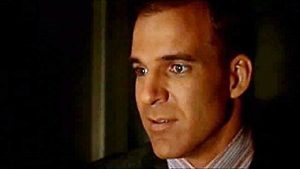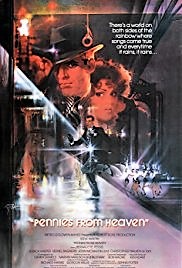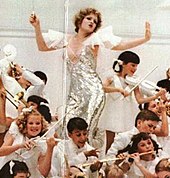Pennies from Heaven *** (1981, Steve Martin, Bernadette Peters, Christopher Walken, Jessica Harper) – Classic Movie Review 6889
Director Herbert Ross’s ambitious and intelligent 1981 American musical romantic drama film Pennies from Heaven is adapted for American audiences by Dennis Potter from his classic 1978 BBC TV drama miniseries, changing its setting from London and the Forest of Dean to Depression-era Chicago and rural Illinois.
It looks great, was immensely costly ($22,000,000) but flopped (it grossed only $9,180,000 in the US). However, it is at least a half success – lots of kudos to the specially game and talented participants and marks for trying.
The film stars Steve Martin as sheet music salesman Arthur Parker who is trying to sell his wares in Chicago in the Thirties Depression, Bernadette Peters, Christopher Walken and Jessica Harper, all of them on notable early form. Their characters’ sad lives and the despair of the Depression era are contrasted with optimistic, sugary, brightly coloured dream-fantasy musical sequences.
Danny Daniels choreographs the lavish musical numbers consisting of actors lip-syncing and dancing to popular songs of the Twenties and Thirties, such as ‘Let’s Misbehave’, ‘Life Is Just a Bowl of Cherries’, ‘Love Is Good for Anything That Ails You’, ‘Let’s Face the Music and Dance’ and of course the title song by Arthur Johnston and Johnny Burke (a Thirties Oscar-nominated treat).
Christopher Walken’s Tom seduces Bernadette Peters’s Eileen with a tap dance and striptease routine on top of a bar (to ‘Let’s Misbehave’). Steve Martin’s Arthur and the sexy Eileen go to a movie (the 1936 Follow the Fleet, though Pennies from Heaven is set in 1934) and end up dancing in formal wear, first with, and then in, a Fred Astaire-Ginger Rogers musical number from the film, ‘Let’s Face the Music and Dance’.
Sadly, this maddened Fred Astaire, who tried and failed to stop the film-makers re-using the Follow the Fleet footage and said: ‘I have never spent two more miserable hours in my life. Every scene was cheap and vulgar. They don’t realize that the Thirties were a very innocent age, and that [the film] should have been set in the Eighties – it was just froth; it makes you cry it’s so distasteful.’
Pennies from Heaven was nominated for three Oscars. Potter was nominated for the 1982 Academy Award for Best Writing, Screenplay Based on Material from Another Medium, but lost to On Golden Pond. Bob Mackie was nominated for Best Costume Design and the third nomination was for Best Sound.
Peters won the Golden Globe as Best Actress in a Motion Picture – Comedy or Musical for her role as Eileen Everson, a schoolteacher turned prostitute. Martin was nominated as Best Actor in a Motion Picture – Comedy or Musical and the third nomination was for Best Motion Picture – Comedy or Musical.
There is a 1936 Bing Crosby film called Pennies from Heaven, directed by Norman Z McLeod, which introduced the title song.
Martin said about the film’s box-office failure: ‘The people who get the movie, in general, have been wise and intelligent; the people who don’t get it are ignorant scum.’ It is Martin’s second starring role after 1979’s comedy hit The Jerk, so it is his first dramatic role He saw the BBC miniseries and called it ‘the greatest thing I’ve ever seen’. He spent six months learning to tap dance.
All the songs are lip-synced except for Martin singing and speaking the title song at the end.
MGM required Potter to to buy back his copyright from the BBC (‘something over $100,000’) and eventually rewrite the screenplay 13 times. MGM blocked the BBC from re-screening the miniseries for a decade.
TV producer Kenith Trodd said Bob Hoskins and Cheryl Campbell, the stars of the original series, ‘were terribly upset that they weren’t considered for the film’.
Four famous paintings are re-created to come alive in the film: Hudson Bay Fur Company and 20 Cent Movie by Reginald Marsh, and New York Movie and Nighthawks by Edward Hopper. Though the film is set in 1934 Chicago, three of them were painted after 1934 and all of them show scenes in New York City.
© Derek Winnert 2018 Classic Movie Review 6889
Check out more reviews on http://derekwinnert.com




